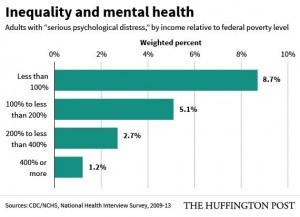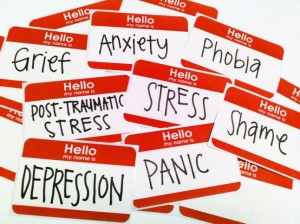MENTAL ILLNESS BIGGER PROBLEM FOR THE POOR, CDC STUDY SAYS
The U.S. Centers for Disease Control and Prevention recently released a report that said mental health problems are more common among the poor than the rich. It was a five year study that looked at the differences of mental health between the rich and the poor. The study concluded that mental illness is a bigger problem for the poor than it is for the rich. The study didn’t say anything most people don’t already know.
“According to the new CDC paper, 8.7 percent of people with incomes below the poverty line, or $20,090 for a family of three, reported serious psychological distress from 2009 to 2013. For people with annual incomes at or above four times the poverty line — that’s $80,360 for a family of three — the figure was just 1.2 percent.” (Huffington Post, May 28, 2015)
The more money you have, the less likely you will be depressed or unemployed because of depression. That’s not to say rich people don’t get depressed. What the CDC study says is as incomes go up the percentage of mental health problems go down. Money can’t buy you happiness but it can help buy treatment and medication. People with money are more likely to be insured than those with low incomes. Rich people can afford to pay for medications and treatment. They can take time off work.
But even the rich plummet from their heights when mental illness starts taking its toll on the family and finances. The rich poor – people who live lavish lifestyles but are maxed out with debt – become vulnerable. Money in the bank goes missing fast when there’s no income. Creditors don’t care if you’re depressed and need money for treatment instead of debt payments.
The CDC study also found that people with mental health issues often have trouble holding a job. Also, not all health providers accept insurance. When unemployed, money is used on basic necessities instead of insurance that might cover the cost of medications and treatment. It becomes an ugly downward spiral. Less money, little or no medication, and mental health issues worsen.
But one question stays unanswered. Do mental health problems cause money problems or do money problems cause mental health problems? It’s the proverbial “Which came first, the chicken or the egg?”
The CDC study ignored the question but it does show that infants and toddlers growing up in low-income communities are more likely to experience toxic stress. Toxic stress is things like neglect, abuse, and domestic violence. These stressors can lead to mental health issues. Women are also more likely to have mental health issues than men.
Finally, is Obamacare getting the poor more help? The CDC study ignored that too, but another study looking at that issue did find Obamacare was getting the poor more help for mental health issues. Young adults who obtained insurance were more likely to get mental health treatment. The conclusion of that study is that access to low cost health insurance leads to better mental health.
Some interesting facts:
Mental illness is a bigger problem for the poor.
In every age group, women were more likely to have serious psychological distress than men.
Among all adults, as incomes went up the percentage of mental health problems went down.
Adults aged 18-64 with mental health issues were more likely to be uninsured.
* Click here to find out more about Terezia Farkas and her Depression help and click here to follow Terezia on Twitter.



